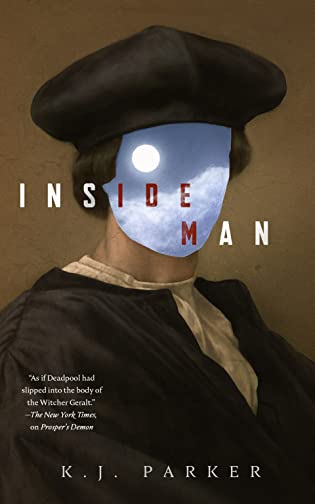 Inside Man by K.J. Parker
Inside Man by K.J. Parker Format: eARC
Source: supplied by publisher via Edelweiss
Formats available: paperback, ebook
Genres: fantasy, horror
Series: Prosper's Demon #2
Pages: 128
Published by Tordotcom on June 15, 2021
Purchasing Info: Author's Website, Publisher's Website, Amazon, Barnes & Noble, Kobo, Bookshop.org
Goodreads
K.J. Parker returns to the amoral world of
Prosper's Demon
with a wry, sardonic novella that flips the eternal, rule-governed battle between men and demons on its head.
An anonymous representative of the Devil, once a high-ranking Duke of Hell and now a committed underachiever, has spent the last forever of an eternity leading a perfectly tedious existence distracting monks from their liturgical devotions. It’s interminable, but he prefers it that way, now that he’s been officially designated by Downstairs as “fragile.” No, he won’t elaborate.
All that changes when he finds himself ensnared, along with a sadistic exorcist, in a labyrinthine plot to subvert the very nature of Good and Evil. In such a circumstance, sympathy for the Devil is practically inevitable.
My Review:
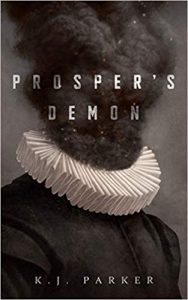 I picked up Inside Man because I was tempted by Prosper’s Demon.
I picked up Inside Man because I was tempted by Prosper’s Demon.
No seriously. I wanted to read this book because I was surprised at how much I enjoyed the first book in what I really didn’t expect to be a series that seems to have begun anyway with Prosper’s Demon.
This series is set in an alternate universe to our own, in an era that is more-or-less like our Renaissance but isn’t exactly – because it isn’t exactly our world.
It is, however, a world where the angels and demons that people believed in during the Renaissance in our own world – and that many still believe in to this day – are quite, quite real. And are competing for the souls of, well, pretty much everyone.
The story in Prosper’s Demon turned out to be a kind of “greater good” story, where the definition of “good” and “evil” really did depend on where you happened to be sitting. Particularly on whether you happened to be the demon living inside Prosper giving him the genius to be his world’s da Vinci, or whether you happened to be the demon-extractor who was supposed to remove the demon if it killed Prosper. And especially even if removing the demon removed Prosper’s genius, which it certainly would, making him normal and depriving his world of everything their da Vinci equivalent would produce in his lifetime.
The story in Inside Man is quite a bit different, and it didn’t work quite as well, at least not for this reader. Even though its combination of Good Omens with The Screwtape Letters was kind of inspired.
 There were points where I had to double check to be sure that I hadn’t accidentally downloaded The Screwtape Letters instead. If you’re not familiar, Screwtape is a senior demon straight out of the mind of C.S. Lewis – and dedicated to his good friend J.R.R. Tolkien, which I how I first made Screwtape’s acquaintance.
There were points where I had to double check to be sure that I hadn’t accidentally downloaded The Screwtape Letters instead. If you’re not familiar, Screwtape is a senior demon straight out of the mind of C.S. Lewis – and dedicated to his good friend J.R.R. Tolkien, which I how I first made Screwtape’s acquaintance.
The book consists of a series of letters from Screwtape to his nephew Wormwood, a Junior Tempter. Screwtape is giving Wormwood pointers on the best methods for tempting humans to sell their souls to the devil. While the whole thing addresses the Christian theological issues that Lewis wrestled with for a significant chunk of his life, the letters themselves are wry, frequently humorous, and have a lot of very true things to say about human nature.
The story in Inside Man does invoke the same kind of “sympathy for the devil” that Screwtape did, but the story feels like it owes a lot more to Good Omens than even it’s predecessor did. Or at least to that part of Good Omens that illustrated the concept that angels and demons have more in common with each other than either of them do with their respective “head offices” back home – whether home is above or below.
Inside Man also plays, and plays hard, with another bit from Good Omens – the bit where both Crowley and Aziraphale find themselves questioning whether either Heaven or Hell really has that ineffable plan that they keep proclaiming they do. And just like in Good Omens, the demon protagonist of Inside Man figures out that they don’t. Have a plan, that is.
But he does.
Escape Rating B-: I loved Prosper’s Demon so I expected to love Inside Man and I was disappointed that I didn’t. Although Prosper borrowed bits from Good Omens, it really did take them in its own direction. It also worked well that the human whose soul is being contested, while he isn’t exactly Leonardo da Vinci, was close enough to da Vinci to ground the story in a sense of the real.
We could appreciate the consequences of the demon vs. demon-extractor debate because we had a pretty clear picture of what those consequences would be. Leonardo da Vinci, any version of da Vinci, would be sorely missed in any world where he existed.
Inside Man made the not-our-world setting more obvious and a bit harder to get past – or perhaps into – by not giving us as clear a frame of reference. Meanwhile, the whole concept of “The Plan” and the lack thereof felt like it borrowed too heavily from Good Omens without giving us Crowley and Aziraphale to root for.
On my third hand, Inside Man is really, really short. I didn’t have any problems finishing it. I just kept wishing it was as good as its predecessor.

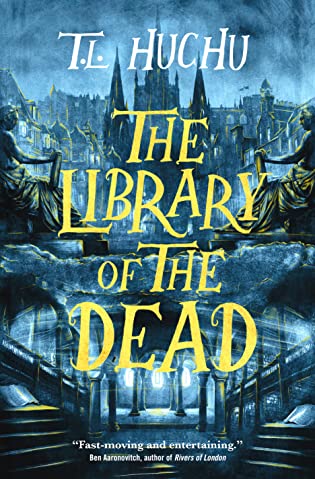 The Library of the Dead (Edinburgh Nights, #1) by
The Library of the Dead (Edinburgh Nights, #1) by 
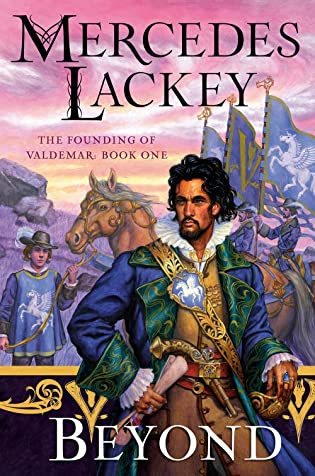 Beyond (The Founding of Valdemar #1) by
Beyond (The Founding of Valdemar #1) by  I read what became the first book in the very long running
I read what became the first book in the very long running 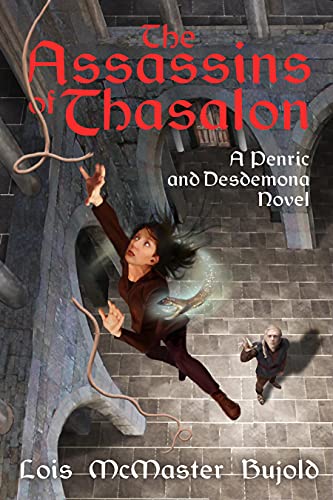 The Assassins of Thasalon (Penric and Desdemona #10) by
The Assassins of Thasalon (Penric and Desdemona #10) by 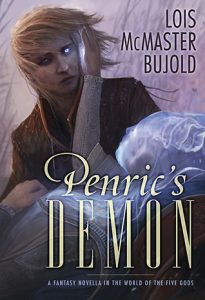 And not that it didn’t begin at the begin in the first book in the series (in both publication order AND internal chronological order!)
And not that it didn’t begin at the begin in the first book in the series (in both publication order AND internal chronological order!) 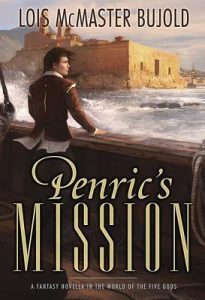 It’s been clear since Penric met Nikys and her brother Arisedya back in the third book in the series,
It’s been clear since Penric met Nikys and her brother Arisedya back in the third book in the series,  The Blacktongue Thief (Blacktongue, #1) by
The Blacktongue Thief (Blacktongue, #1) by 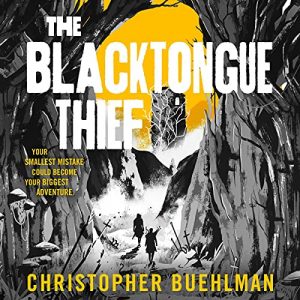
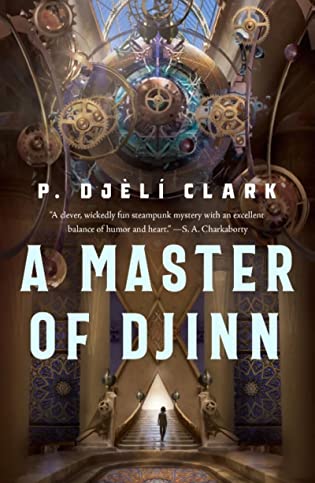 A Master of Djinn by
A Master of Djinn by 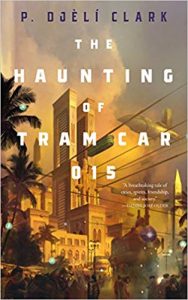 Escape Rating A++: Honestly, I want to just sit here and squee. A lot. This was amazingly awesome from beginning to end and I don’t say that lightly. This is one of those stories that made me think pretty much all the thoughts and I’m still reeling a bit from the absolutely epic book hangover.
Escape Rating A++: Honestly, I want to just sit here and squee. A lot. This was amazingly awesome from beginning to end and I don’t say that lightly. This is one of those stories that made me think pretty much all the thoughts and I’m still reeling a bit from the absolutely epic book hangover.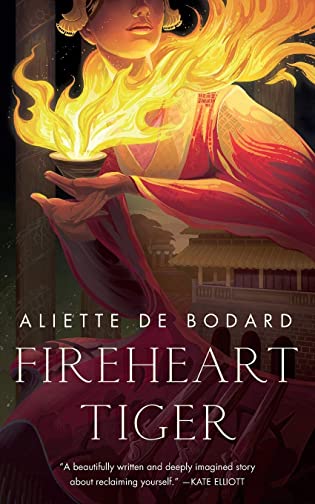 Fireheart Tiger by
Fireheart Tiger by 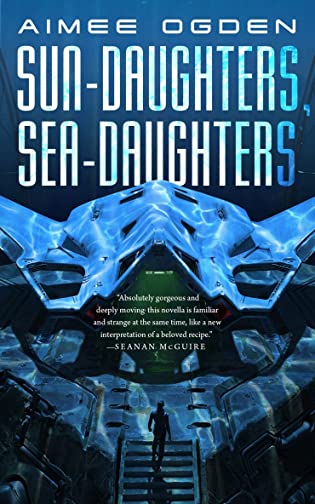 Sun-Daughters, Sea-Daughters by
Sun-Daughters, Sea-Daughters by 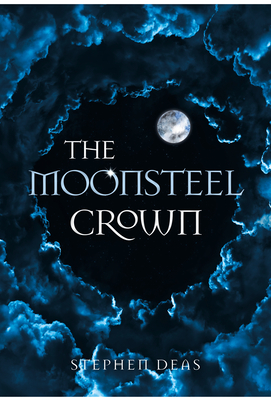 The Moonsteel Crown (Dominion, #1) by
The Moonsteel Crown (Dominion, #1) by 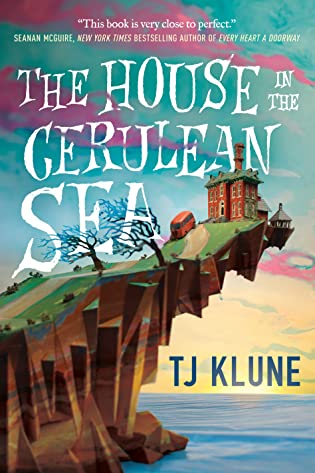 The House in the Cerulean Sea by
The House in the Cerulean Sea by 